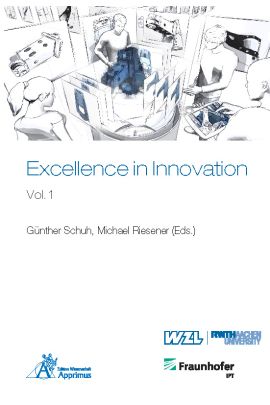Today manufacturing companies in high-wage countries are more than ever confronted
with rapidly changing requirements and an uncertain global environment. Shorter product
lifecycles and development cycles, more product variants caused by more differentiated
customer demands, an increasing product complexity and functional complexity as well
as decreasing delivery and throughput times are characteristic consequences for companies
in this turbulent environment. Companies need to structure internal and external
complexity in an effective and efficient way (e.g. in modular product platforms) and they
need to execute changes along the value chain. Often there is no systematic process to
tackle the problem of overwhelming complexity in products and processes.
Furthermore, development projects usually need more time and effort in order to achieve
the envisioned goals. Development Management and the ability to finish innovation projects
on time, on budget and with a solution fulfilling the customers’ needs are very important
for the sustainable future of manufacturing companies in different branches. Although
approaches like Lean Innovation have brought first insights into success factors in
the past years productivity in many development projects can still be hugely increased.
Today the ability to handle complexity along the whole product lifecycle and to adapt to
changes quickly has become an important competitive factor for manufacturing companies.
But many companies are trapped in inflexible processes and innovations are nowadays
developed by using a stage-gate-process which structures the development process
into different phases. Stage-gate-processes often do not allow to react quickly to
uncertainties such as new or changed requirements.
Companies that are able to address these challenges with defined processes, methods
and tools can achieve a significant competitive advantage. Excellence in innovation can
be described as a vision for companies especially in high-wage countries such as Germany.
To achieve sustainable competitive advantages and excellence in innovation the consideration
of Complexity Management, Development Management and Agile Product Development
has been identified as crucial. All these topics are dealt with in this book giving
a complete overview of upcoming trends which can be used as an executive guide for
managers in the manufacturing industry with the scope of detecting required changes and
helping to implement them successfully.
Complexity Management remains to be a very important factor for producing companies
since the definition of product requirements, the elaboration of product structures and
modular product platforms and the structuring of product related data along the value
chain are main drivers for productivity in the development process. Several papers underline
the importance of an effective and efficient Complexity Management. The corresponding
chapter starts with papers concerning the conceptualization and planning of
modular platforms, before customer-oriented product portfolios and the modular platform
design are presented. The chapter ends with papers concerning technical changes in
modular product platforms.
Development Management addresses the underlying development process in manufacturing
companies. Lean Innovation and the analysis of the development process are relevant
fields of action that are described in this chapter. The right setup of development
projects in terms of the identification of the right complexity level at the beginning of projects
is a main success factor as described in different papers. Furthermore, data-based
approaches gain more and more acceptance also in Development Management.
In the context of Industrie 4.0 the ability to be more flexible and adaptive to changes is a
major field of action for companies. In recent times many companies try to adapt the
methods from the software industry where agile development methods have been implemented
successfully many years ago. Agile Product Development for mechatronic products
is a main driver to overcome inflexible structures in today’s companies. Different
papers show first approaches to introduce Agile Product Development in the manufacturing
industry.
This book consists of previously published papers on the mentioned subjects and is
aimed at middle to top management working in the manufacturing industry. It gives first
insights into challenges and trends in the fields of Complexity Management (Part I), Development
Management (Part II) and Agile Product Development (Part III) as main drivers
influencing Excellence in Innovation and the competitiveness of companies in high-wage
countries.
| Autor | Schuh, Günther; Riesener, Michael (Hrsg.) |
|---|---|
| Lieferzeit | 3-4 Tage |
| Gewicht | 0.49 kg |
| Erscheinungsdatum | 26.10.2018 |
Ingenieurwissenschaften
Excellence in Innovation Vol. 1
Kurzbeschreibung
Today manufacturing companies in high-wage countries are more than ever confronted
with rapidly changing requirements and an uncertain global environment. Shorter product
lifecycles and development cycles, more product variants caused by more differentiated
customer demands, an increasing product complexity and functional complexity as well
as decreasing delivery and throughput times are characteristic consequences for companies
in this turbulent environment. Companies need to structure internal and external
complexity in an effective and efficient way (e.g. in modular product platforms) and they
need to execute changes along the value chain. Often there is no systematic process to
tackle the problem of overwhelming complexity in products and processes.

